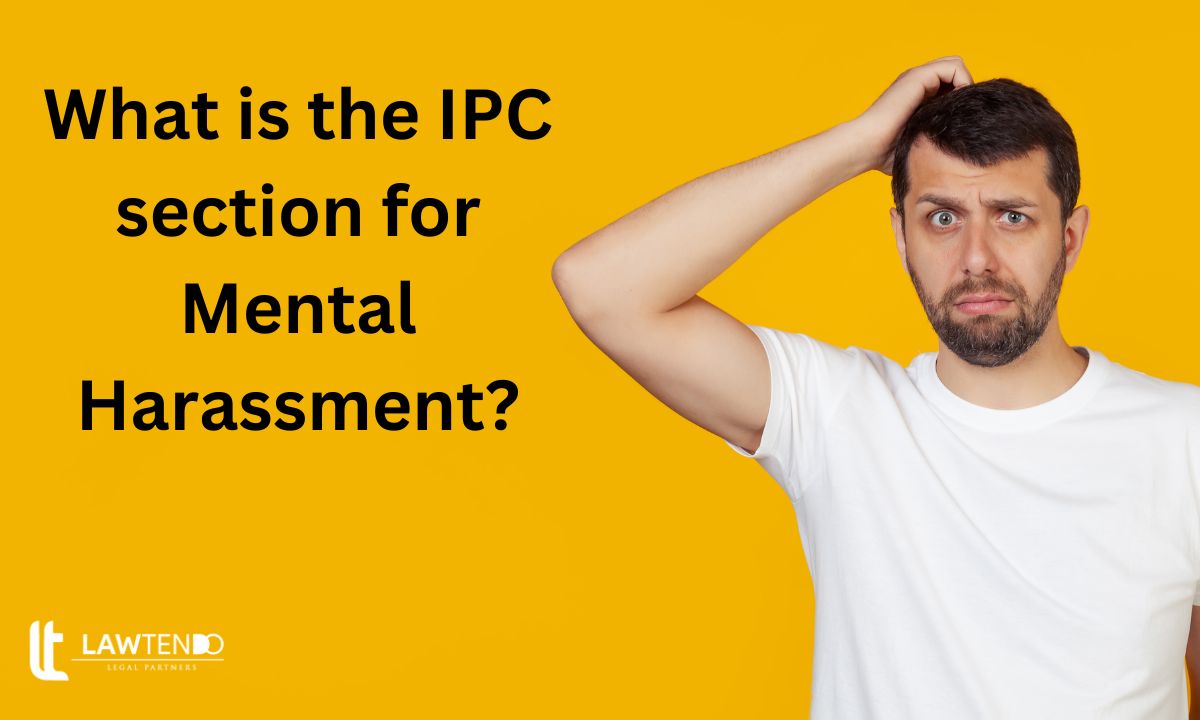What is the IPC section for Mental Harassment?

Date : 23 Nov, 2023
Post By admin
Understanding Mental Harassment under the Indian Penal Code (IPC)
Mental harassment is a distressing and often overlooked form of harm that individuals can experience in various aspects of life. In the context of the Indian Penal Code (IPC), there isn't a specific section that explicitly addresses mental harassment as a standalone offense. However, several IPC sections can be invoked to address instances of mental harassment.
One of the primary sections often applied in cases of mental harassment is Section 498A. This section primarily deals with cruelty towards a married woman by her husband or his relatives. While it is commonly associated with cases of dowry harassment, its scope extends to encompass mental cruelty as well.
Section 498A and Mental Harassment:
In the eyes of the law, mental cruelty is deemed as a form of cruelty. Section 498A recognises mental harassment as a punishable offense and includes acts that cause grave mental agony and suffering to the victim. This may involve constant verbal abuse, threats, intimidation, or any willful conduct that could drive the woman to contemplate suicide or cause grave injury to her mental health.
It's important to note that mental harassment is often intertwined with other forms of cruelty, and the legal system aims to address the holistic impact on the victim. The objective is to protect individuals from not only physical harm but also the psychological trauma inflicted upon them.
Understanding Mental Harassment Beyond Section 498A:
While Section 498A is a crucial tool in addressing mental harassment, it's not the only legal provision that can be invoked. The IPC's Section 509 addresses any words, gestures, or actions meant to disparage a woman's modesty. This can extend to verbal harassment that causes mental distress.
Moreover, Section 506 covers criminal intimidation, which includes threats that induce fear of injury or harm, thereby affecting the mental well-being of the person. In cases where mental harassment escalates to the point of causing fear for one's safety, Section 506 may be applied.
Legal Perspectives and Challenges:
Despite the existence of these legal provisions, proving mental harassment in a court of law can be challenging. Unlike physical harm, mental distress often lacks visible evidence. Courts may rely on the testimony of the victim, witnesses, or other forms of evidence to establish the emotional and psychological impact of the harassment.
It's essential for individuals facing mental harassment to document instances, gather any available evidence, and seek legal counsel. Legal professionals can guide victims on the appropriate sections to invoke and help build a case that addresses the nuances of mental harassment.
Workplace Harassment and IPC:
Instances of mental harassment in the workplace have become a growing concern. While specific provisions in the IPC may not directly address workplace harassment, legal avenues like Section 354A (sexual harassment) and Section 509 (word, gesture, or act intended to insult the modesty of a woman) can be invoked if the mental harassment takes a gendered or sexualized form. Additionally, laws like the Sexual Harassment of Women at Workplace (Prevention, Prohibition, and Redressal) Act, 2013 provide a specific framework for addressing workplace harassment.
Cyberbullying and IPC:
With the rise of digital communication, cyberbullying has emerged as a significant form of mental harassment. IPC Sections 503 (criminal intimidation) and 507 (criminal intimidation by anonymous communication) can be applicable in cases of online threats and harassment. Furthermore, Section 66A of the Information Technology Act, although repealed, has been historically used to address offensive online communication.
Stalking and IPC:
Stalking is a form of persistent and unwanted attention that can lead to severe mental distress. Section 354D of the IPC explicitly addresses stalking and provides legal recourse for victims. Stalking, when it causes fear for one's safety or induces mental harassment, can be penalized under this section.
Legal Challenges in Mental Harassment Cases:
Proving mental harassment in a court of law poses unique challenges. Unlike physical harm, mental distress often lacks visible evidence. Courts may rely on the testimony of the victim, witnesses, or other forms of evidence to establish the emotional and psychological impact of the harassment. Legal professionals play a crucial role in guiding victims through the complexities of presenting a case that addresses the nuanced nature of mental harassment.
Conclusion:
While the IPC may not have a dedicated section specifically labeled "Mental Harassment," it does offer legal recourse through various sections that recognize and penalize acts causing mental distress. Recognizing the impact of mental harassment is a crucial step in ensuring the well-being of individuals, and the legal system plays a vital role in providing avenues for justice in these complex cases. As societal awareness grows, it is hoped that legal mechanisms will continue to evolve to better address the nuanced and often invisible aspects of mental harassment. If you have any more queries we the experts at Lawtendo are more than happy to help you.





